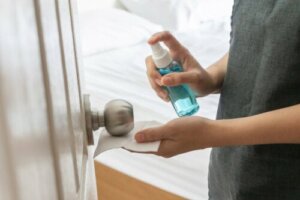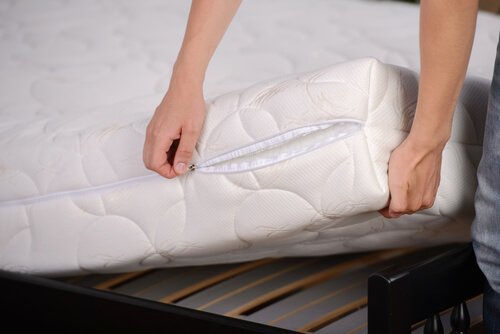Natural Ways to Disinfect the Bedroom

Making sure you disinfect the bedroom naturally is crucial for having a completely healthy environment for a pleasant night’s sleep. Often, we think that just cleaning and washing sheets are enough, but it doesn’t tend to be the case.
We spend many hours in the bedroom at night. As a result, it’s the ideal place for certain microorganisms that can cause health problems. As you may know, some bacteria, fungi, and mites have strong resistance. They continue living and thriving despite how well or often you do the cleaning.
For this reason, you need to disinfect things to get rid of them. Some of these agents can cause allergies in more than 10% of people, according to a study published in the International Journal of Immunopathology and Pharmacology. In addition, people with asthma are very sensitive to them.
Disinfection with natural products may be recommended especially if there are small children or pets in the home, as they’re likely to be susceptible to certain agents contained in cleaning products.
Five steps to disinfect the bedroom naturally
To successfully disinfect your bedroom, you need to consider all the things that you find there. This means you can’t limit yourself to just washing the bedsheets. You need to pay attention to all of the corners of the room.

With just a simple glance you may not notice, but everyday dust, mites, and other allergenic molecules accumulate. Some of these can cause discomfort or affect your sleep. As a result, it’s important to take the time you need to clean and disinfect your bedroom.
Learn how to use Vinegar as a Disinfectant Around the House
1. Sheets and blankets
The first thing to remember is that you should make your bed every day and wash the sheets at least once a week, as recommended by experts at Milton Hershey Medical Center.
You should also wash your blankets, duvets, mattress covers, etc., but you don’t need to do this as often. These also accumulate particles, dirt, and mites that can be harmful to your health.
Follow these steps:
- Wash your bedding with neutral soap
- Shake them well daily
- Ventilate the room for at least five minutes
- Make your bed every day after ventilating
- Vacuum them to get rid of particles (a study conducted by researchers at the University of Michigan advises against dry vacuuming, as it can bring the person into contact with various particles)
2. Disinfect the bedroom by disinfecting your mattress naturally
This is one of the most contaminated parts of the room because it’s where your body rests. It absorbs a large amount of sweat during the night and also accumulates a lot of dust. To disinfect it well, you simply need to make and apply a straightforward homemade product.
The properties of the ingredients of this preparation are what make it possibly effective in treating this problem. First of all, baking soda has properties to clean surfaces and eliminate, for example, fungi. This effect is proven by research published in Mycopathologia.
For its part, eucalyptus essential oil, the real “star” of this natural solution, is an outstanding acaricide among oils of this type. This is detailed in a study published by the Journal of Zhejiang University Science in 2006.
Ingredients
- 1/2 c. of baking soda
- 10 drops of eucalyptus essential oil

Preparation
- Put the baking soda in a bowl
- Add the eucalyptus oil
- Mix well and let it sit for five minutes
Instructions
- Firstly, sprinkle the mixture all over the mattress
- Secondly, leave it to act for one hour
- Then, vacuum it
- Finally, put the cover back on if it has one
Learn how to Easily Sanitize and Clean Your Mattress and Your Pillows
3. Disinfect the bedroom: windows and curtains
Curtains can be very colorful, decorate the room, and also block out the light from the windows. However, because they’re so close to points of entry, they also prevent dust from getting in or out.
As a result, a lot of dirt and mites accumulate that you need to get rid of. You should wash them once a month and before you hang them back up you should clean the windows.
4. Disinfect the floor naturally
All dirt, germs, and bacteria inevitably end up on the floor. It’s crucial that you disinfect it naturally for a clean and healthy environment.
To do this, follow these simple steps with two ingredients that you’re sure to have at home. You can use vinegar, which helps naturally disinfect according to a study published in Infection Control and Hospital Epidemiology, and lemon juice, which provides a pleasant aroma.
Ingredients
- A 3 qt. bucket of warm water
- 2 tsp. of apple cider vinegar
- 1 tsp. of lemon juice
Materials
- Mop or scrubber
- Vacuum cleaner or broom

Preparation
- Firstly, add the vinegar to the bucket of warm water
- Then, add the lemon juice and stir well
- Finally, soak the mop or scrubber in the mixture
Instructions
- Firstly, vacuum or sweep the floor
- Then, mop the entire floor
- Finally, leave it to dry
5. Purify the air with plants
Plants in a room generate a sense of harmony, peace, and well-being. In addition, they also act as purifiers for the air. You can put something small in your bedroom. Some recommended plants for purifying the air, and therefore to sleep better are:
- Jasmine
- Lavender
- Gardenias
- Cacti
- Valerian
Disinfect the bedroom and live better
If you disinfect the bedroom regularly, you won’t just be maintaining a pleasant environment from an aesthetic point of view, but you’ll also be taking care of your health.
In short, a clean, tidy, and well-ventilated bedroom on a daily basis can keep some common health problems at bay, and help you be more protected, even while you sleep.
All cited sources were thoroughly reviewed by our team to ensure their quality, reliability, currency, and validity. The bibliography of this article was considered reliable and of academic or scientific accuracy.
- Saad, e., Hussien, R., Saher, F., & Ahmed, Z. (2006). Acaricidal activities of some essential oils and their monoterpenoidal constituents against house dust mite, Dermatophagoides pteronyssinus (Acari: Pyroglyphidae). Journal of Zhejiang University. Science. B, 7(12), 957–962. https://doi.org/10.1631/jzus.2006.B0957
- Letscher-Bru, V., Obszynski, C.M., Samsoen, M. et al. Antifungal Activity of Sodium Bicarbonate Against Fungal Agents Causing Superficial Infections. Mycopathologia 175, 153–158 (2013). https://doi.org/10.1007/s11046-012-9583-2
- Controlling Dust, Dust Mites, and Other Allergens in Your Home. Michigan Medicine. University of Michigan. https://www.uofmhealth.org/health-library/rt1233
- How to control dust mites. Milton Hershey Medical Center. http://pennstatehershey.adam.com/content.aspx?productid=28&pid=28&gid=000111
- Li, L., Qian, J., Zhou, Y., & Cui, Y. (2018). Domestic mite-induced allergy: Causes, diagnosis, and future prospects. International journal of immunopathology and pharmacology, 32, 2058738418804095. https://doi.org/10.1177/2058738418804095
- Rutala WA, Barbee SL, Aguiar NC, Sobsey MD, Weber DJ. 2000. Antimicrobial activity of home disinfectants and natural products against potential human pathogens. Infection Control and Hospital Epidemiology. https://www.ncbi.nlm.nih.gov/pubmed/10656352
This text is provided for informational purposes only and does not replace consultation with a professional. If in doubt, consult your specialist.








